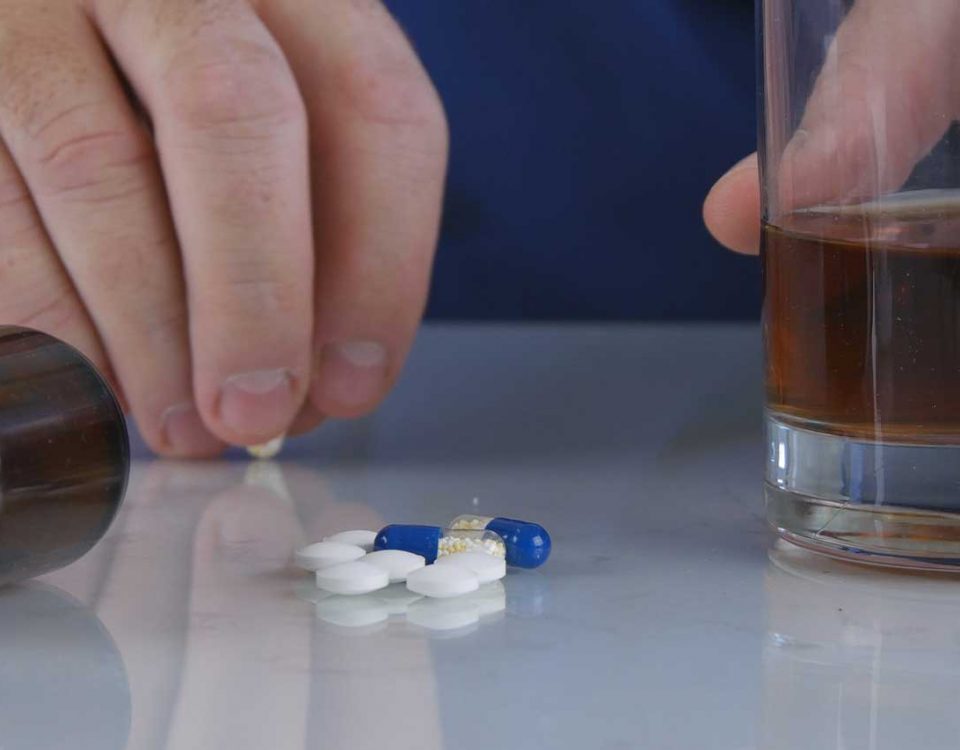Opioids and stimulants are two types of drugs that affect the central nervous system (CNS) differently. While opioids like Percocet are commonly used to alleviate pain, stimulants like Adderall are usually prescribed to people with ADHD to improve their ability to focus and control their impulses. In addition to these abilities, Adderall and Percocet both have a high potential for abuse and addiction. But what happens if they’re combined? Can you take Percocet and Adderall together? The Stuart, Florida, Banyan Treatment Center is here to answer these questions and more.
What Is Percocet?
Percocet is the brand name for a combination of oxycodone hydrochloride, which influences the brain’s perception of pain, and acetaminophen, which inhibits chemicals in the brain related to pain. Like other opioids, Percocet binds to opioid receptors in the brain to block pain signaling and stimulate the release of a neurotransmitter called dopamine.
Dopamine is a “feel-good” chemical messenger that plays a role in mood and pleasure. It’s naturally released by the brain whenever we do something we enjoy, such as eat or have sex. However, it’s also stimulated by certain drugs, such as opioids.
The release of dopamine is the main reason why drugs like Percocet also have a potential for abuse and addiction, so much so that the overprescription of opioids has led to an opioid epidemic in the United States.
Even when taken as prescribed, Percocet can produce a variety of side effects, some milder than others. If you’ve been prescribed this medication and experience any adverse effects, be sure to speak to your doctor.
Some mild effects of Percocet include:
- Dizziness
- Sedation
- Nausea and/or vomiting
- Blurred vision
- Dry mouth
Because of its effects on dopamine, people also may abuse Percocet to experience a euphoric high. When abused, this drug can produce a rush of pleasure and an intense sense of well-being.
Although Percocet is often viewed as a safer opioid, it works in the body the same way as illicit drugs like heroin, meaning that the risk of addiction when using it is just as high. As with heroin, tolerance to Percocet can quickly form with continuous misuse, which can lead the individual to use more of the drug to experience the same effects.
In the end, this growing and persistent use of Percocet can give way to physical dependence and addiction, which can affect a person’s life in more ways than one. While the legitimate use of Percocet can induce certain unpleasant side effects, the risks of developing serious health problems are exponentially higher when the drug is abused.
What Is Adderall?
A prescription drug used to treat symptoms of attention-deficit hyperactivity disorder (ADHD), such as impulsive behavior and inability to focus or concentrate, is Adderall. As a CNS stimulant, Adderall works to improve concentration and impulse control by increasing neural activity in the brain.
Adderall is the brand name for a combination of dextroamphetamine and amphetamine. It increases activity in the CNS by altering certain naturally occurring chemicals in the brain, like dopamine and norepinephrine.
People with ADHD who take Adderall may experience improvements in symptoms like hyperactivity, impulsivity, and attention span. When prescribed and taken as directed, Adderall’s effects on the central nervous system can provide some positive effects, such as improved concentration.
But, similar to Percocet, Adderall may still produce some undesirable side effects, such as:
- Nervousness
- Restlessness
- Headache
- Difficulty sleeping or staying asleep
- Dry mouth
- Dizziness
- Slowed speech
- Changes in vision
Abusing or overusing Adderall can produce more serious side effects, such as paranoia, anxiety, hunger, panic attacks, anxiety, and more. These effects may occur if someone takes higher doses of Adderall, which is considered drug abuse.
Long-term drug abuse eventually leads to physical dependence and addiction. People with a physical dependence on Adderall may experience withdrawal symptoms if they suddenly reduce or quit using it, which may include symptoms of depression, panic, anxiety, paranoia, and more.
Can You Take Adderall and Percocet Together?
No, you cannot take Adderall and Oxycodone together. Although certain medications are prescribed together, these prescriptions are carefully written and determined by the prescribing physician to prevent any negative reactions. Do not mix medications on your own without the approval or prescription of your doctor.
Some people may abuse prescription drugs by combining them with other medications. When someone mixes Percocet with Adderall, the side effects can be deadly.
Both of these medications affect the central nervous system and functions like heart rate, blood pressure, and breathing differently. When combined, their side effects may be exacerbated, which can produce life-threatening reactions.
While Percocet may depress the CNS and functions like breathing and heart rate, Adderall may stimulate these functions, producing opposing effects. Although a Percocet and Adderall high may produce euphoria, this sensation is usually short-lived and less prominent than the combination’s riskier side effects.
Together, Percocet and Adderall can put an immense amount of pressure on the respiratory and cardiovascular systems. As a result, possible Adderall and Percocet side effects may include:
- Coma
- Slowed or depressed breathing
- Cardiac arrest
- Heart attack
- Heart failure
- Extremely high or low blood pressure
- Changes in body temperature
- Impaired mental/cognitive functioning
- Overdose
- Death
Taking stimulants and opioids together also poses the threat of overdose. Not only do these substances produce opposite side effects, but taking them together can overwhelm the central nervous system, inhibiting life-sustaining functions like heart rate and breathing.
What Not To Take When on Adderall?
Although the risky interactions between Oxycodone and Adderall are well-known, there are other drug types that have to be avoided as well. A class of drugs that fall under this category include central nervous system depressants, which include alcohol and benzodiazepines (Xanax, Valium). The stimulating effects of Adderall may be counteracted by these depressants, causing an erratic reaction in the body. Additionally, there is a higher chance of cardiac problems, breathing difficulties, and even overdose when Adderall is combined with depressants. It's imperative to speak with a doctor before taking any new drugs, particularly ones that contain Adderall.
Another class of drugs to be cautious of when taking Adderall is serotonergic medications, which influence the levels of serotonin in the brain. Serotonin syndrome is a potentially fatal illness that can occur when Adderall is combined with serotonergic medications such as selective serotonin reuptake inhibitors (SSRIs) or serotonin-norepinephrine reuptake inhibitors (SNRIs).
If treatment is not received, symptoms of this condition can range from minor (agitation, fast heartbeat) to severe (high fever, seizures), and in some cases, they can even be fatal. To protect their safety and well-being, those who are prescribed Adderall must let their doctor know about all of the prescriptions they are taking. Recall that changing a drug schedule should only be done with the advice and oversight of a licensed healthcare provider.
What Pain Reliever Can I Take With Adderall?
While it's generally safe to take nonsteroidal anti-inflammatory drugs (NSAIDs) like ibuprofen (Advil) or naproxen (Aleve) alongside Adderall for pain relief, it's important to be mindful of potential interactions. These medications effectively reduce inflammation and can alleviate mild to moderate pain. However, always adhere to recommended dosages and consult with a healthcare professional if you have any doubts about the appropriate dosage or frequency.
In addition to NSAIDs, acetaminophen (Tylenol) is considered a safe option to manage pain while taking Adderall. This analgesic works by blocking pain signals in the brain and is generally well-tolerated when used according to the recommended guidelines. It provides an alternative for individuals who may be advised against NSAID use due to specific health conditions or contraindications. Nonetheless, always consult your healthcare provider for personalized advice on managing pain in conjunction with Adderall.
Getting Help for Polydrug Abuse
Mixing drugs is a serious form of substance abuse that increases your risk of dependence and addiction. While some addictions start as taking prescription medication or experimentation, a serious problem can quickly develop.
If you feel like you’ve lost control of your drug use or know someone who has, don’t wait to get help. Our Florida drug rehab offers various levels of substance abuse treatment, including medically monitored detox and therapy programs, to help patients overcome the physical, mental, and social impact that drugs and alcohol have had on their lives.









